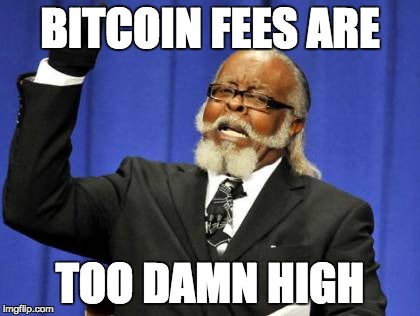The Why of Bitcoin
Published 31 Jan 2018
Prologue
 I sit at a large table at a pub near Green Lake in Seattle. People around me spout words like “NAP”, “agorism”, and “austrian economics”. There is a giddiness amoungst the group that find themselves surrounded by like minded freaks and geeks after years of feeling like an outsider. These people are not quite normal. These people are Anarcho-Capitalists. It’s November 11, 2009 and I am one of these weirdos.
I sit at a large table at a pub near Green Lake in Seattle. People around me spout words like “NAP”, “agorism”, and “austrian economics”. There is a giddiness amoungst the group that find themselves surrounded by like minded freaks and geeks after years of feeling like an outsider. These people are not quite normal. These people are Anarcho-Capitalists. It’s November 11, 2009 and I am one of these weirdos.
Anarcho Capitalism is essentially a sub-set of libertarianism. Like libertarians they value freedom and protection of individual rights. However, AnCaps have come to the conclusion that any government powerful enough to protect rights will ultimately be corrupted and end up taking rights away (see: history of every government ever). So they say let’s just dispense with the whole nation state government idea and work things out peacefully without coercion like civilized people. Radical.
It’s been noted that many libertarian minded folks also tend to work in tech, as do I. Why? I speculate that tech attracts skeptics, rationalists, tinkerers and experimenters. They were the nerds and geeks that read a lot of Sci-Fi and Fantasy back when that stuff was definitely not considered cool. They tend to be dreamers and visionaries and generally don’t accept prevailing dogma. That’s not to say they are always right, but they are open to weirdness and change because they don’t accept the status quo as the best we can do.
Get a bunch of anti-authoritarian techno nerds together and Bitcoin will come up (or get invented as it turns out). This is how I first got interested in Bitcoin. At the time (winter 2009/2010), one bitcoin was worth around one to five cents. It seemed like an interesting technology experiment, not a get rich scheme. The early adopters were using it because of the innovation and the mission.
The Mission
Bitcoin sprang to life in 2008 from the seeds of the crypto-anarchists of the 80’s and 90’s. Ten years later and we still don’t definitively know who the creator Satoshi Nakamoto is. His/her/their original Bitcoin whitepaper is available on Bitcoin.org. The whitepaper is no political manifesto. It simply describes the mechanics of how to conduct peer to peer electronic money transfers without the need for a financial institution. The implications are revolutionary.
Bitcoin’s properties are that it is:
-
Open - As Bitcoin has gained mainstream attention there have been many a snear about “techno elite”, but there are no Bitcoin gatekeepers. Bitcoin is open source, which means any 14 year old that knows some JavaScript can participate in the technology. Buying some bitcoin is as easy as buying a pair of socks on Amazon at this point. Contrast this to secretive government agencies and corporations.
-
Borderless - One powerful use case is international remittances. Anyone with a smart phone can use Bitcoin. This is a big deal for the 2+ billion adults on the planet without access to financial services. Bitcoin creates huge opportunities for financial inclusion where it was not possible before. Borders are now irrelevant as far as money is concerned.
-
Trustless - Meaning that blind trust in the Bitcoin network is not required for sending or receiving bitcoin. Everything is transparent and verifiable. There is no third party that you have to trust. The only trust required is that the fundamental rules of mathematics will not suddenly change. Trustless decentralized consensus is reached via “mining”, which is covered in this 5 minute video on how Bitcoin works.
Follow the Money
In modern history money has always been issued and controlled by governments and banks. Bitcoin created a means for individuals to exchange value with each other anytime/anywhere without a centralized middle man validating the transaction. Instead, a decentralized peer to peer network acts as the middle man. Bitcoin does not require you to trust your government to not debase your currency, or to trust your bank to invest your savings responsibly and ethically. There’s no central point of failure, no corruptable authority figure - just nodes in a network talking to each other using advanced crytography and reaching a consensus on the state of the blockchain (the public ledger recording all transactions).
You may say “that’s all well and good, but why should I care?”, so here are some of the issues with the current government/bank run system:
-
Inflation of the money supply creates a regressive hidden tax that’s especially hard on the poor. That minimum wage you bring home buys less and less over time. Prices go up while package sizes get smaller. Raising the minimum wage treats the symptom, not the cause. When this scenario gets really bad we get hyperinflation as we’ve seen distroying the fabric of society in Venezuela these past few years. There have been many notable episodes of hyperinflation throughout history. Bitcoin has a hard coded limit of 21 million units and the supply can never be inflated.
-
War. Solid arguments have been made regarding how the U.S. military action in the middle east over the past few decades is largely about U.S. petro-dollar hegemony, and less about security. Saddam Hussein and Muammar Gaddafi both wanted to accept a non U.S. dollar currency for oil. It’s rather coincidental that they are both dead now. Wars are sold to the public as either a humanitarian effort (for liberals), or safety/security (for conservatives), but the primary driver is almost certainly money and power. Read War is a Racket by Major General Smedley Butler if you haven’t yet.
-
Transparency (lack of). A public blockchain ledger can not be faked or manipulated. This makes auditing easy. Contrast this to secret government spending programs, federal reserve manipulations, and bank loan scandals and money laundering.
-
Security. How many stories about hacked sites have you read about this year? How much of your personal information like your SSN or credit card number is floating around on the dark web for sale to hackers? Probably more than you’d like there to be. Bitcoin is crytographically secured and there is no central database storing all of your personal information. There is just a private key that you control. As long as your private key is secure, your bitcoin is secure.
Challenges
 It’s now been about 8 years since I first started paying attention to Bitcoin. A lot has happened - some good, some bad. Here are some of the ongoing challenges and corresponding recommendations:
It’s now been about 8 years since I first started paying attention to Bitcoin. A lot has happened - some good, some bad. Here are some of the ongoing challenges and corresponding recommendations:
-
Exchanges are potential central points of failure. The good news is that people are hard at work creating decentralized exchanges.
-
Individuals are susceptible to social engineering/hacks if they are lax in their security. Don’t keep significant amounts of bitcoin or any cryptocurrency in online exchanges. Research and use paper or hardware wallets.
-
Software forks, developer drama, and uncertainty around regulations. Time will tell here. Crypto advocates need to start working together effectively to push back against the most unreasonable regulations. If governments continue down a path of regulating everyone into criminality, then the best approach with probably continue to be to innovate around and make regulations irrelevent. This is probably the most likely long term trend. Laws are hard to change, pushing code is faster and easier.
-
Transaction backlogs and high transaction fees prevent Bitcoin from being useful for small transactions. Lightning Network is currently being tested, which is being hailed as a solution to the network congestion and scaling issues. Lightning Network is an off chain protocol that allows a lot of transactions to be handled off of the main Bitcoin blockchain and only settled up with the main chain periodically. Sort of like a networked bar tab for your bitcoin.
Summary
People talk a lot about the question of “what is Bitcoin?”, but they don’t tend to ask “why does Bitcoin exist?”, which is probably more important. Hopefully this post touches on the answer a bit. Bitcoin forges on like the Honey Badger of cryptocurrency despite many challenges and setbacks. The technology is still young and developing. While I cannot provide financial advice, I can say with some confidence that Bitcoin and/or other cryptocurrencies are here to stay. Ignore it at your peril. We are still in the early days of cryptocurrencies and a lot of big changes are still to come. It’s going to be a wild ride. Stay tuned.